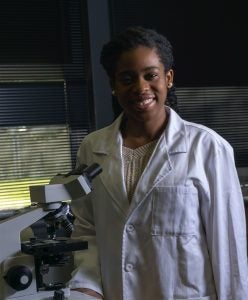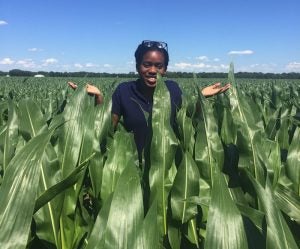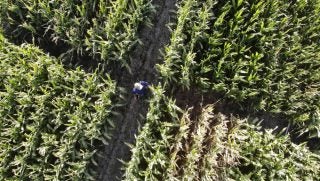When I was little, I wanted to be a pediatrician, then an architect, then a teacher.
In 10th grade, my biology class watched a PBS documentary about urban agriculture. I did not love that class, but the movie caught my attention. It would change my life. It showed Black and Brown people farming in cities across the country, like Los Angeles and Milwaukee. For the first time, I saw a representation of myself in agriculture.
In 2016, I enrolled at Southern University and A&M College, an 1890 land-grant institution in Louisiana, to major in Agricultural Sciences. From the moment I stepped on campus, I felt seen. As the daughter of two parents who attended historically Black colleges, I knew the importance of being in an environment that would nurture my growth as a young Black woman.

Southern University poured the world into me. I participated in organizations like Minorities in Agriculture, Natural Resources and Related Sciences (MANRRS), a personal and professional development organization where I gained friends and mentors across the country. I met some of my best friends in the College of Agriculture and Family and Consumer Sciences. I got internships that allowed me to move to the Midwest and experience a different pace of life. I will always be grateful for these experiences.
During this time, I also realized how hard the agricultural industry is for people like me. Beyond the history of traumatic slavery and exploitation, I learned about the present-day disparities and hardships that Black farmers and agriculturalists across America face. I learned about discriminatory lending practices by the U.S. Department of Agriculture and the Second Morrill Act. I learned stories of New Farmers of America. I experienced what it looked like for two land-grant institutions in the same cities to have vastly different federal and state support. Specifically, this has manifested in many institutions by states not providing 1890 institutions with 100 percent state matching funds. For example, Tennessee State University found that the state of Tennessee owes TSU about $500 million dollars in state matching funds. For me, this looked like professors going out of their way to ensure that we had the best classroom experiences despite there only being a few professors in my department at the time.
I attended conferences for major agriculture organizations and got stares that reminded me that I, a young Black woman, did not belong.

I look back at these times often. To be young and experiencing vastly different emotions and levels of support was confusing. I walked the halls with Black women and men with Ph.D.’s in plant science and DVMs. Yet during my internships, I would not see anyone who looked like me for months. I would spend time at Southern University feeling so supported and would go to conferences where I was constantly second-guessing how I talked, dressed, or wore my hair.
These experiences were a reflection of what it means to be Black in America.
There is a certain resilience that Black farmers and agriculturalists must possess to achieve any success in this field. There is a certain reckoning we all must face when deciding to pursue careers to feed the world. We sometimes give up the notion that we will be surrounded by people who look like us and understand our experiences. We prepare ourselves to be the “first,” and often the “only.” We brace ourselves for micro-aggressions, injustice, and outright racism. We hold with us the history of trauma that our enslaved ancestors experienced in agriculture. Yet, we love this field anyway.
These feelings are what it’s like to love a land that does not love us. To know what it means to feed the world, to serve communities, and to fight for our lives all at once.
This is why I tell myself I do belong.
Because despite the centuries of racist policies, systemic discrimination, and uncomfortable stares, I am blessed to know how hard those before me have worked to feed the world. I am proud to know of Booker T. Washington, Fannie Lou Hammer, and U.S. Rep. Marcia Fudge. I know that because of them, there is space for me in this industry. I am grateful for that.
Irene Lewis is a recent Master’s student in the John Glenn College of Public Affairs at The Ohio State University with a major in public administration with a focus on public policy and management. She is a south Louisiana native and food justice and access advocate.



